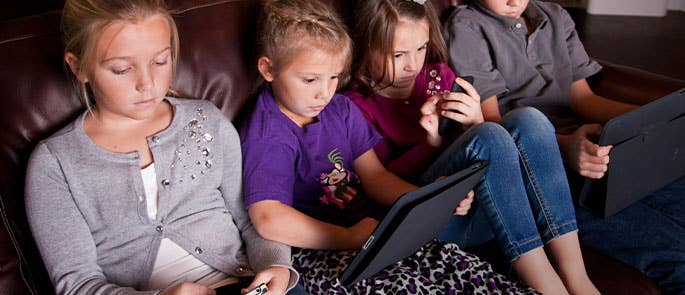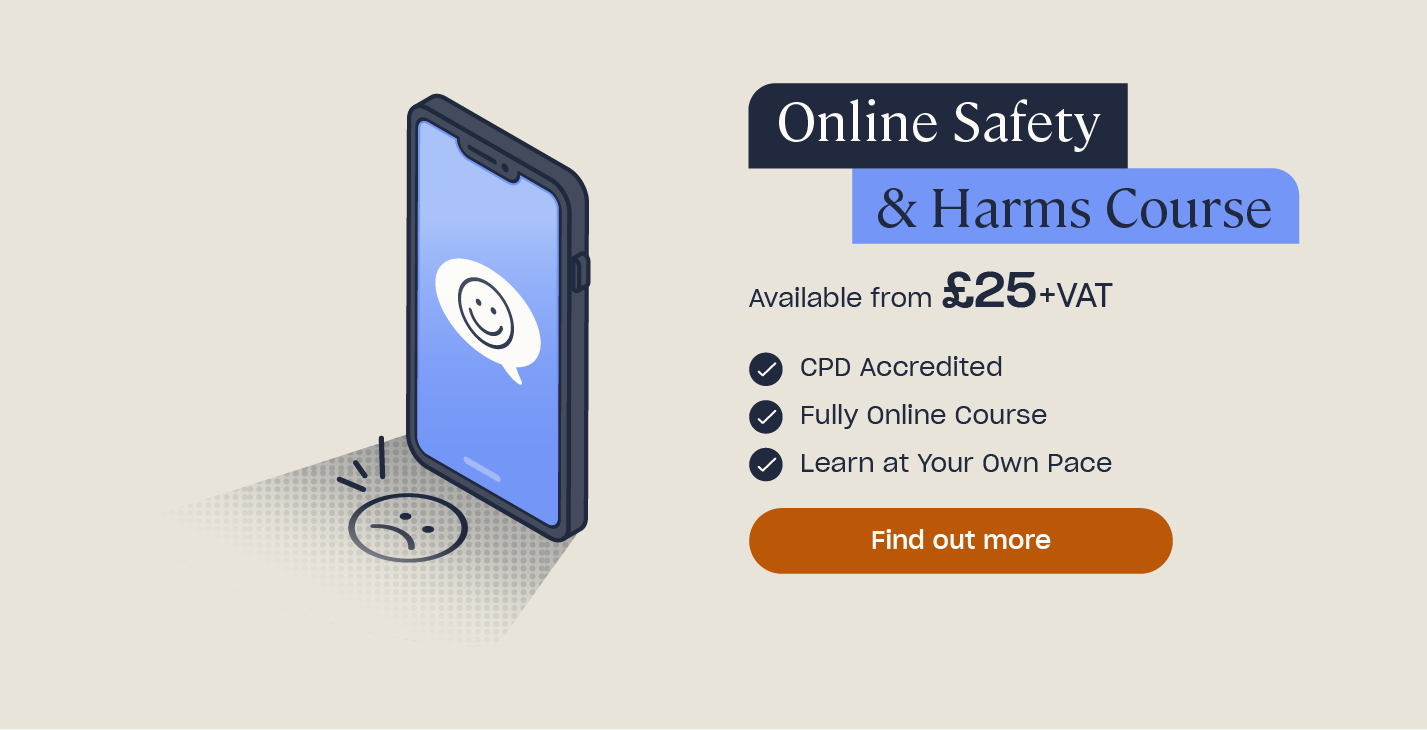Screen Time for Children: Advice for Parents
Screen time on mobile devices has quickly become a big part of everyday life for most children and young people. Not only do children use screens when at home, but also at school as an essential part of their learning experience. Too much screen time, however, can be detrimental. In this article, we’ll look at the effects of prolonged screen time on children, explain why limiting screen time can have a positive impact on children and look at how to implement limited screen time at home.
What is Screen Time?
Screen time refers to the amount of minutes or hours a person spends looking at a digital screen each day. This includes devices such as desktop computers and laptops, TVs and games consoles, tablets and mobile phones.

Children might use screen time for a variety of activities – playing games, streaming videos, watching TV shows, browsing the internet and chatting with friends, for example. They’ll also do screen time activities as part of their education – such as in school and whilst doing homework.
Children having some screen time is not an issue and, for many, it can be a useful tool for handling growing up in the modern world. The problem is when too much screen time begins to affect their mental and physical wellbeing.
In 2024, Ofcom found that:
- 24% of 5-7 year olds own a smartphone.
- 76% of 5-7 year olds use a tablet.
- 38% of 5-7 year olds use social media.
- 41% of 5-7 year olds play games online.
- 32% of 8-17 year olds have seen something upsetting online.
Furthermore, Childwise, who carry out research with children, recently found that children spend an average of three hours online per day, with over half of them saying they sleep with a mobile phone next to their bed.
Why Should Parents Limit Screen Time?
The amount of time a child or young person should spend on a screen is a topic that’s constantly up for debate. Screen time is a modern-day phenomena and not one that parents are likely to have encountered in their own youth, so understanding how much screen time is acceptable and how much is harmful is uncharted territory for most.
Studies are regularly carried out into the effects of screen time and why parents should limit screen time for their children. The National Institute for Health and Care Excellence (NICE) recommends children should have a two hour limit on screen time.
What’s generally accepted by the research, is that parents should look to limit children’s screen time in order to improve their child’s digital wellbeing and to focus on how the screen time is being spent, not just how long it lasts.
Too much screen time of the wrong sort – scrolling through social media, comparing their lives with the snapshots of others and being subject to hateful comments, for example – can negatively impact a child’s mental health. Not only do children and young people suffer from the effects of comparison with others, but too much screen time can also trigger long-term stress and anxiety.
A study by the ONS into children’s mental health found that ‘Increased stress, anxiety, poor self-esteem, depression, behaviour disorders, self-harm, sleep deprivation, eating disorders, poor social relationships and poor progress at school have also been linked to excessive use of social media’. This is why monitoring your child’s device usage and restricting their screen time is so vital to their wellbeing.
Want to Learn More?
Our Child Mental Health Training provides you with a detailed understanding of children’s mental health and awards you everything you need to be confident in your ability to support any child who may need it.
Recommended Screen Time by Age
The World Health Organisation (WHO) and NHS both recommend screen time limits of:
- Babies and toddlers aged 0 to 2 – no screen time at all
- Preschool children aged 2 to 4 – up to one hour per day.
- School children aged 5 to 12 – up to two hours per day.
- Teenagers aged 13+ – no more than two hours per day.
Benefits of Limiting Screen Time
Limiting the amount of screen time that your child has will be beneficial to their mental and physical wellbeing. In fact, the NHS states that the use of screen time for very young children (under two years) is linked to long-term difficulties with attention, communication, managing emotions, problem-solving and social skills.

Some benefits of limiting screen time for children include:
- Quality of sleep is improved. Screens emit blue light which affects a child’s sleep cycle, making it harder to fall asleep or waking them in the night when they receive a notification on their phone.
- Anxiety and other mental health conditions are reduced. This is particularly linked to the use of social media, which can trigger worry, stress and anxiety for young people.
- Better relationships. Reduced screen time will lead to more time available for you to spend as a family or for the child to see friends, thus enhancing both relationships and communication.
- Reduced eye strain. Constantly looking at a screen makes eyes tired and dry, putting strain on a child’s eyesight.
- A healthier lifestyle. Limiting screen time means children need to look elsewhere for entertainment, so they are more likely to be physically active rather than sedentary. This also makes them less likely to become overweight.
- Better educational attainment. Studies have found that limiting children’s screen time is linked with improved cognition, better mental ability and increased attainment at school.
How to Limit Screen Time
If your child hasn’t had rules around screen time before, then introducing screen time limits can be challenging. What’s important is that you discuss the reasons behind the restrictions with your child, so they understand why screen time limits are beneficial to them.

Some tips for limiting screen time include:
- Act as a role model for your child and limit your own screen time, as well as theirs. Children are influenced by the adults they live with, so show them a good example.
- Introduce rules for the whole family, such as no phones at the table or no TV before school, so everyone is included in the screen time limits.
- Provide your child with fun alternatives to screen time, such as a trip to the park, games outside, baking and cooking, scavenger hunts in the garden, reading, etc.
- If you notice your child is spending a lot of time on a screen, break up their screen sessions with enforced breaks. You could set a timer that allows them one hour of screen time before they have to move onto another activity.
- Prioritise sleep, with rules on not using devices before bed or in the bedroom and not sleeping next to their phone at night.
- Use the parental controls available on phones, apps and your wi-fi router to limit access or set time limits. Some apps allow you to set a timer that means the app is locked once the limit is reached.
- Avoid giving your child their own smartphone or laptop where possible. Instead, put the family computer in a shared space where you can monitor their screen time more easily.
If your child becomes upset, frustrated or angry about new screen time limits, remember that this reaction is normal, especially if excessive screen time is a normal part of their day at the moment. Try to see the situation through your child’s eyes and explain to them, in language they’ll understand, why a reduction in screen time is important. It’s also a good idea to point out all the fun things they can do instead!
Setting a limit on screen time for children is essential for their mental and physical wellbeing. Devices with screens are part of modern life and banning screen time completely is unlikely to be helpful or practical so, instead, introduce screen time boundaries for your child and your family to adhere to. If limited, screen time can become a positive asset to a child’s life, rather than a concern.
Further Resources:
- Online Safety & Harms Training
- Internet Gaming Safety: Tips for Parents
- Parents’ Guides to Social Media Apps
- Why is Cyberbullying Harmful and What Actions Can You Take?
- Mobile Phones in Schools Debate: Advantages and Disadvantages











